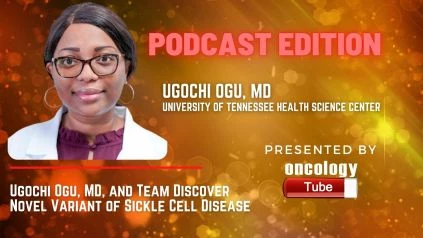Ugochi Ogu, MD, an assistant professor in the Division of Hematology and Oncology at the University of Tennessee Health Science Center speaks about Ugochi Ogu, MD, and Team Discover Novel Variant of Sickle Cell Disease.
Link to Article:
https://news.uthsc.edu/ugochi-ogu-md-and-team-discover-novel-variant-of-sickle-cell-disease/
Ugochi Ogu, MD, an assistant professor in the University of Tennessee Health Science Center’s Division of Hematology and Oncology, and her colleagues have found a new kind of sickle cell illness.
Sickle cell disease is a hereditary blood condition that causes faulty hemoglobin to be produced in the bloodstream. The condition requires two faulty copies of the gene, one from each parent, and the severity of the sickness is determined by the nature of the combination, which can range from moderate to life-threatening.
Dr. Ogu performed hemoglobin electrophoresis after one of her patients had a positive sickle cell screening, which indicated around 40% of sickle hemoglobin (Hb S) and nearly 50% of an unknown hemoglobin variation. The researchers used genetic sequencing to identify that the unknown variety was the extremely unusual hemoglobin (Hb) Haringey, and that the patient had a unique sickle cell disease variant called Hb S/Haringey, which was composed of hemoglobin (Hb) S and Hb Haringey.
“First Report of Compound Heterozygosity for Hb S (HBB: c. 20A> T) and Hb Haringey (HBB: c. 131A> G),†her paper on this new variation, is published in the scholarly journal Hemoglobin.
Dr. Ogu, the medical director of Regional One Health’s Diggs-Kraus Comprehensive Sickle Cell Center, is a board-certified pediatric hematologist-oncologist with a specialty in sickle cell disease and the transition from childhood to adult medicine. She was previously the assistant director of the Montefiore Medical Center/Albert Einstein College of Medicine’s Sickle Cell Center for Adults. Her roles have given her considerable expertise in children and adult medicine, and she considers herself a sickle cell disease specialist who treats patients throughout their lives.
Hb Haringey has only been documented twice, according to Dr. Ogu: once in a scientific publication and once in a register. Dr. Ogu’s results show that Hb S/Haringey is likely a moderate, if not benign, type of sickle cell disease, despite the fact that her sample size is only one and the patient has migrated to a foreign country. This, she and her colleagues believe, is due to the new variant’s possible enhanced affinity for oxygen in the circulation.
She underlined the significance of sickle screen-positive individuals with unclear hemoglobin electrophoresis findings seeing a hematologist for genetic sequencing to explore and confirm any aberrant variations detected in their screens, if feasible. As a result, the sample size will increase, and health care providers will get a better understanding of new variations.

